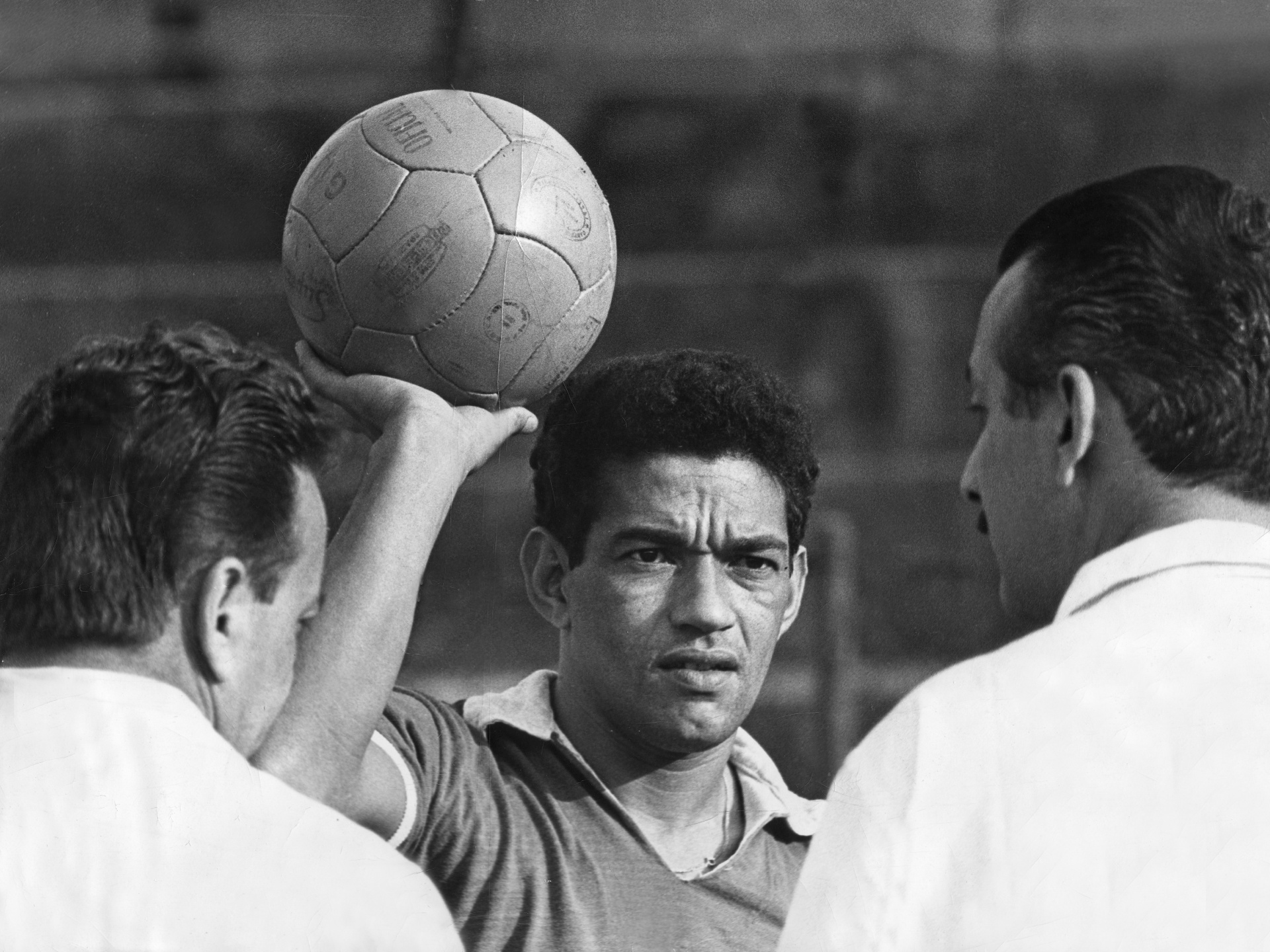Before the emergence of Cristiano Ronaldo and Lionel Messi, the debate about the greatest footballer of all time had largely centred around another feted duo — Diego Maradona and Pele.
But many in Brazil and outside have long wondered whether Pele was even the best player that country has produced or whether the true owner of that title was Manuel Francisco dos Santos, better known by his nickname of Garrincha.
Those who saw Garrincha play still speak about the way he could effortlessly dribble past defenders with an unnatural balance or choose to accelerate past them with his speed. He asserted a rare control over the ball, and is credited with prompting the first shouts of “Ole” from spectators as if he were a matador teasing and tormenting a bull.
This rare talent took Garrincha from Pau Grande, a small village located to the north of Rio de Janeiro, to Botafogo – where he won three state championships – and then to the World Cup, which he helped Brazil win in 1958 and 1962.
“In the entire history of football, no one made more people happy,” the Uruguayan writer Eduardo Galeano once said. Indeed, his former teammate Pele himself declared, “Garrincha was an incredible player, one of the best there has ever been. He could do things with the ball that no other player could do.”
An incredible career
Garrincha, whose grandparents had been enslaved, was born in October 1933 with his left leg six cm (2.3 inches) longer than his right. His left leg curved outward, while his right leg was bent inwards. He had an S-shaped spine. A doctor would later examine him and declare him a “cripple”.
He was a small and fragile child, which prompted his older sister Rosa to give him the nickname of “Garrincha”, which means “little bird” in Portuguese.
But his natural talent was too great to be restrained by his size, and on his debut for Botafogo in 1953, he scored three times against Bonsucesso. During the course of the following 12 seasons, he scored a total of 249 goals in 579 games for the club.
He made his international debut for Brazil in 1955, but was not selected for their opening two games at the 1958 World Cup in Sweden. By the tournament’s third game, history was made when Garrincha and a 17-year-old Pele played together for the first time and helped their side earn a 2-0 win over the Soviet Union.
With the pair in the starting lineup, Brazil never lost in 40 games — a fact of which Pele proudly reminded the world in 2013.
Did you know Garrincha and I never lost a game when we played together? pic.twitter.com/g0bgq25Sm2
— Pelé (@Pele) May 24, 2013
In Sweden, they combined to give their country new momentum, which saw them overcome Wales and France to reach the final against the hosts. On June 29, 1958, inspired by Garrincha, who created their opening two goals, Brazil won their first World Cup with a 5-2 win over Sweden in Stockholm.
As well as a winner’s medal, Garrincha was voted into the All-Star Team.
“Garrincha was more of a danger than Pele — he was a phenomenon, capable of sheer magic,” said the Wales full-back Mel Hopkins. “It was difficult to know which way he was going to go because of his legs and because he was as comfortable on his left foot as his right, so he could cut inside or go down the line and he had a ferocious shot.”
His talent sparked interest from several leading European clubs, but despite lucrative approaches from Juventus, Inter Milan and Real Madrid, Garrincha was content to remain in Brazil.
The peak, and the slide
Brazil arrived at the 1962 World Cup finals in Chile as the favourites, but disaster struck in their second game when Pele sustained a leg injury that forced him to miss the rest of the tournament.
But Garrincha stepped into the breach and led Brazil to a second consecutive World Cup. He scored twice against England in a 3-1 win in the quarterfinals and then twice again in the semifinals against host Chile, which Brazil won 4-2. He then overcame a severe fever to play in the 3-1 win against Czechoslovakia in the final in Santiago.
Garrincha became the first player to finish a World Cup as winner of the Golden Boot as top scorer, the winner of the Golden Ball as player of the tournament, a place in the All-Star Team, and most importantly, a winner’s medal. An impressed Chilean newspaper El Mercurio asked, “What planet is Garrincha from?”
He was still only 28 years old at this World Cup, but it would prove to be the peak of his career. The shape of his legs was beginning to cause him terrible pain, and within a year, the state of his knees would not let him play two consecutive games.
He had been advised to have an operation to correct his legs as far back as 1959 but had refused until he was finally forced to in 1964. By then it was too late, he already lost of most of his pace and mobility and was never the same player again.
He had comfortably played more than 30 games a season for most of his career. But he could not manage as many matches in total across three seasons following 1962.
In 1966 Garrincha managed to return to the World Cup and scored a memorable goal in a 2-0 win against Bulgaria, but he could not prevent his country from losing 3-1 to Hungary and being knocked out of the tournament at the group stage. That would prove to be his 50th and final appearance for Brazil and, incredibly, the first time he had ever lost while wearing the national jersey.
He was a carefree spirit, possibly too carefree — both on and off the pitch. He first became a father at the age of 18 and had another 13 children by five different women during his life. His father was an alcoholic, who died from it, and Garrincha, too, would drink heavily.
The end of joy
Garrincha’s injuries and reliance on alcohol had diminished him as a player by the end of the 1966 World Cup. Still, he continued for seven more years and featured sparingly for four clubs — Brazil’s Corinthians, Flamengo and Olaria, and Atletico Junior in Colombia.
In April 1969, he was believed to be drunk while driving a car when it was involved in an accident that killed his mother-in-law, Dona Rosario. There were reports he attempted to take his own life afterwards.
In 1973 at the age of 40, Garrincha officially retired with a farewell match between a FIFA team and Brazil, hosted at the iconic Maracana stadium in Rio de Janeiro in front of a crowd of 131,000.
Garrincha did not enjoy a happy retirement: He had not saved any of his earnings from his career, either because he had spent them or been taken advantage of by others. He did not even have enough to help secure a loan to buy a house.
He struggled for work, briefly representing the Brazilian Coffee Institute as an ambassador, and began to feel forgotten and almost abandoned by the football community.
On January 19, 1983, aged just 49, he slipped into an “alcoholic coma” and was rushed to hospital for his eighth visit that year. Early the following day, he died of cirrhosis of the liver.
A strong sense of grief gripped Brazil in the days afterwards, and millions would line the funeral procession between the Maracana and his hometown of Pau Grande.
While Brazil has produced many great players, few were loved as much as Garrincha for his rare talent and his imperfections. Many Brazilians could see themselves in him and how he so clearly played the game for fun.
On his gravestone is the simple and apt inscription: “Here rests in peace the one who was the Joy of the People – Mané Garrincha.”



